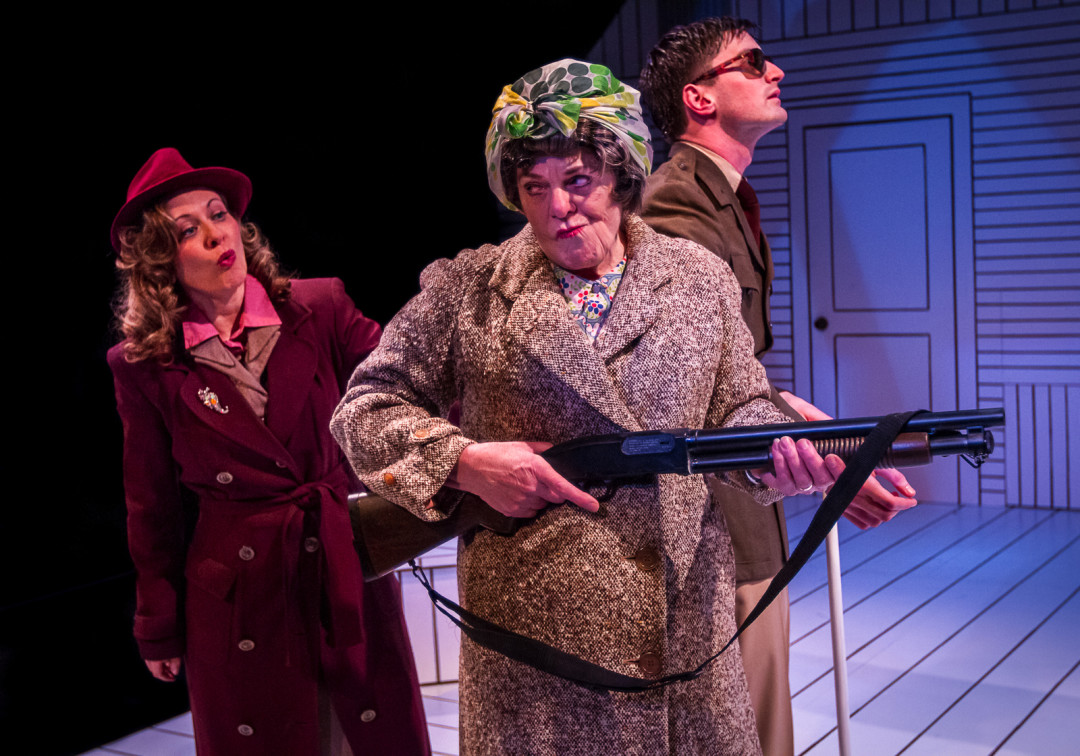Review: Artists Rep's "Red Herring"

Val Landrum, Vana O'Brien, Joshua Weinstein. Photo by Owen Carey.
Artists Repertory Theatre's new show, Red Herring, purports to be a spy story (or at least a playful homage to spy stories). But the play, written by Philadelphia-based playwright Michael Hollinger and directed by Oregon Shakespeare Festival veteran Christopher Liam Moore, has its own secret identity: love story.
Over the course of Red Herring, Hollinger reels in three tangled romantic plot lines. Maggie (Val Landrum) is a dedicated cop in 1950s Boston (the first woman officer on the city's police force, in fact) with a sharp retort ever at the ready and a wicked New England accent to deliver it in. She may have found her match in Frank (Leif Norby), a G-man who, despite his traumatic romantic history, wants to take her on a honeymoon—and sure, they'd have to get married first. Maggie, though, is hesitant, and it's more than cold feet: this detective has a cold case in her past.
When Maggie and Frank are assigned to the same investigation, the murder of a Russian fisherman suspected of being part of a Soviet spy ring, we're introduced to Red Herring's second would-be couple—and possible culprits: Mrs. Kravitz (Vana O'Brien), the victim's landlady, and her allegedly mute, alleged husband (Michael Mendelson). As our law-enforcement lovers are gathering evidence from the crime scene, Joshua (James Appel), an idealistic young physicist, is asking the equally innocent girl with whom he's been going steady—and who just happens to be Joseph McCarthy's daughter—to marry him. But no sooner has Lynn McCarthy (Amy Newman) accepted than Joshua makes a surprising revelation: he's passing blueprints of the H-bomb to the Soviets—and he wants her to aid and abet him.
Red Herring
Artists Repertory Theatre
Thru March 17Red Herring doesn't truly aspire to anything greater than light comedic fare. Even so, the play is too light, on both comedy and substance. Aside from some amusing noir nods and witty repartee, the show is funniest in scenes not central to the plot, skit-like divertissements featuring gimmicky characters: a city-hall marriage licensor full of divorce statistics; a worldy-wise, unrufflable bridal-shop proprietor. Back in the main action, Red Herring's humor consists of either tired, ball-and-chain-type jokes about marriage or gratingly exaggerated physical humor.
The production's ensemble cast gives decent performances all around, but the characters they're working with are shallow and lack believable motivations. Why would the decidedly nonradical Joshua commit treason based on a sketchy international-affairs concept? Why would McCarthy's adoring daughter help him? (And why make her McCarthy's daughter in the first place? The implausible conceit hardly serves a purpose.)
When Red Herring's story lines intersect in a silly, saccharine, slapstick climax, the last fragments of its hardboiled shell fall away to reveal the play for what it is: about relationships, which are defined by Maggie as “two ordinary people in an imperfect world who happen to love each other something fierce.” It's a well-put conclusion, to be sure, but not one supported by the play's “evidence.” In Red Herring's relationships, characterized by double lives and Cold War espionage, little about real, undramatic romantic relationships has been discovered, or even explored. Lovely and true though the play's message may be, it rings as hollow as a false alibi.




